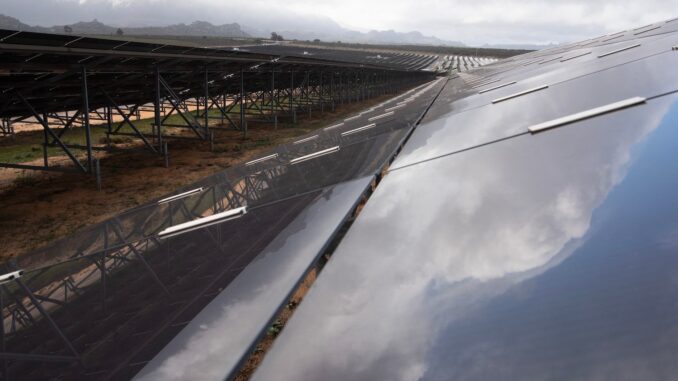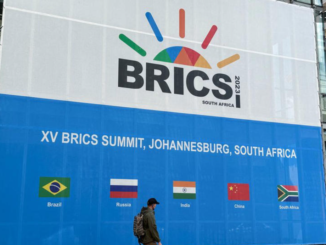
Clean energy was not a priority for voters—and a weakened ANC will make climate-friendly policies even less likely.
Why South Africa Won’t Be Going Green
Clean energy was not a priority for voters—and a weakened ANC will make climate-friendly policies even less likely.
A general view of the Paleisheuwel solar plant, which was established by Italy-based Enel Green Power, in partnership with South African electricity public utility Eskom, in Paleisheuwel, South Afrcia on June 5. This solar plant can produce 82MW of electricity, which can power 48000 households.
In the months of debate culminating in South Africa’s May 29 election, there was one campaign issue that was conspicuously absent. Across the globe in this year of elections, climate change—and how to deal with its causes and effects—has featured prominently in many campaigns, from India to the European Union to Britain.
In the months of debate culminating in South Africa’s May 29 election, there was one campaign issue that was conspicuously absent. Across the globe in this year of elections, climate change—and how to deal with its causes and effects—has featured prominently in many campaigns, from India to the European Union to Britain.
With flash floods repeatedly striking KwaZulu-Natal province since 2016, and temperatures throughout the country rising at about twice the global rate, one might think that South Africa would be a place where these issues were especially pertinent. In 2020, the Western Cape province only just escaped “day zero” after five years of water shortages, and the average South African spent 20 percent of each day in 2023 without power due to a reliance on dirty, outdated forms of energy generation.
At the U.N. Climate Change Conference in 2021, Britain, France, Germany, the United States, and the EU mobilized $8.5 billion to aid South Africa in the initial stages of the country’s Just Energy Transition, an opportunity you’d expect any government to leap at. Yet, during the recent campaign, the climate was barely mentioned by any party contesting the election.
This is surprising for many reasons. Looking simply at the headline figures, South Africa is Africa’s largest emitter of greenhouse gases, releasing 435.9 million metric tons of carbon into the atmosphere in 2021. This is almost double the amount of the next highest, Egypt, and nearly a quarter of the continent’s overall emissions.
The figures are so drastic largely because of the country’s overreliance on coal, which accounts for 85 percent of South Africa’s power generation, making it the most coal-dependent G-20 nation. The vast majority of the troubled energy utility Eskom’s 14 coal-fired power stations were commissioned between 1961 and 1996 and are reaching the end of their lifespan. Despite increasing warnings, little has been done to upgrade or renovate them.
Even so, so-called green policies have become a cornerstone of economic and industrial recovery plans put forth by the ruling African National Congress (ANC). The party’s recent manifesto outlined plans to “become a world player in green hydrogen, battery and electric vehicle production,” building on existing policies and investments that have developed significant and growing capabilities in renewable energies, from which these industries can grow.
It is somewhat startling, then, that in an election campaign in which the ANC was pilloried, its climate targets and green industrial policies were left unmentioned by its rivals. Now, as South Africa prepares for a new chapter of coalition politics—the clean energy transition should be taking center stage, but a weakened ANC may mean that the issue is completely swept under the rug.
Climate change has only emerged as a definitive issue in South Africa in the last couple of years. This came at the instigation of current President Cyril Ramaphosa. A key advisor to Ramaphosa on climate issues described it to me as his “passion project.” Ramaphosa has stated that he sees net zero not only as a way to fight climate change but also as one of the only means by which South Africa can solve its endemic economic stagnation and sky-high unemployment.
As is well documented, between 2009 and 2023, South Africa’s economy grew by a yearly average of only 1.1 percent, while unemployment stands at 45.5 percent among 15- to 34-year-olds. With many of South Africa’s traditional labor-intensive industries, such as coal mining, not necessarily conducive to a green future, it is understandable that Ramaphosa saw renewables and nascent green industries as a solution. The country’s economically devastating load-shedding was partly the result of a reliance on outdated coal.
South Africa is classed by the research firm Zero Carbon Analytics as one of the few countries with excellent capabilities in both solar and wind energy. Initial investment has already produced an energy mix where 14 percent of South Africa’s electricity is carbon-free. The 2022 Climate Change Bill, recently sent to Ramaphosa for approval, has set a national greenhouse gas emissions trajectory, with a staged decrease in carbon emissions in the decades to come.
While some green investment has come from the state, South Africa’s position as the 14th-largest global emitter has also encouraged external support, culminating in the Just Energy Transition deal.
None of these climate-positive steps have yet to see tangible results, however. And all long-term green plans are vulnerable to political change. An ANC source has claimed that climate initiatives could be one of the “first casualties” of any incoming coalition government, being over-associated with the failing ANC.
For example, Zakhele Mbhele, a former shadow cabinet member of the center-right Democratic Alliance (DA), one of the ANC’s more likely coalition partners, said in an interview that the party is “focused on the need for faster economic growth and job creation,” at the expense of green policies with no immediate short-term impact.
Measures still in their early stages are also reversible. Internally, the ANC has set 2026 as the date when the country will begin to see the nascent green industries taking shape. Until that point, the benefits of green industrialization will not be felt. Before these ends become manifest, it is natural that the means will be questioned, especially in the absence of any significant climate change lobby in the country.
Although some environmental movements exist, these struggle to garner significant support beyond a narrow portion of the middle classes, with more pressing issues at hand for many. With green industries still in their early stages of growth, there is also little to no business climate policy lobbying in support of the measures the government has taken.
Meanwhile, the traditional power industries on which South Africa continues to rely remain vocal, not least as they generate the greater proportion of the country’s revenue. Coal mining still employs some 90,000 people while also generating nearly $11 billion for the economy. While this is the case, Kaizer Nyatsumba, the former CEO of South Africa’s steel federation, suggested to me that the only way parties can “try to respond to” these economic issues in the short term is with continued investment in carbon-heavy areas.
Nyatsumba also outlined how many industry leaders, mirroring similar arguments in China and India, criticize the West for advocating net-zero policies among developing nations when they have caused many of the problems the globe is facing. They see policies such as the EU’s Carbon Border Adjustment Mechanism as overly restrictive and punitive.
Just as early investment in green industries began, contracts were also handed out to Russian companies involved in offshore oil drilling. In each party’s 2024 manifesto, there was an emphasis on this kind of re-industrialization, seen as the only means for immediate economic salvation. Therefore, according to Nyatsumba, emissions are likely only to increase in the next few years.
Even in the longer term, any transition away from the country’s well-consolidated industries would require investment in reskilling, while there would also be an inevitable backlash from the coal lobby. South Africa’s power utility Eskom recently confirmed that it would delay the decommissioning of three of its older coal-fired power stations to 2030.
The ANC’s ambitious green plans would also require the investment of significant political capital that, after a calamitous election result in which the party’s vote share fell to below 50 percent for the first time, it does not have. Any coalition partner is hardly to be as vehemently in support of green industries.
As mentioned above, Mbhele has described climate policy as a “point of contention” in the DA, while any sort of electoral pact—which now seems unlikely—with the radical populist Economic Freedom Fighters would, as Steven Gruzd of the South African Institute of International Affairs told me, “lead the rand to tank” as part of a “more significant economic downturn.” This would leave little to no capital for bolder projects.
Any instability can only make progress toward South Africa’s climate goals doubtful. The immense capital required is not available, even in best-case scenarios. Although the $8.5 billion of funding will be a valuable trigger for the opening stages of coal’s phaseout, billions more in homegrown investment will be needed to back it up.
To begin to develop capabilities in green hydrogen, a clean fuel in which South Africa has started investing, an incoming government would need to increase energy generation capacity to 6 to 7 gigawatts of renewable capacity per year. This is a significant margin, since it only generated 6 gigawatts in total from 2011 to 2022.
The government has estimated that the buildup of green hydrogen infrastructure would require $133 billion in total, and green hydrogen is only one part of the “three-pronged” approach to cutting carbon emissions. This also includes continuing investment into solar and wind power and the beginning of an electric vehicle revolution. (A mere 1.45 percent of new cars sold in South Africa in 2023 were hybrid or fully electric.)
Such levels of expenditure in an economy that is currently stagnant will also require balancing with pressing needs for greater investment in the fields of education and health care.
While it is unclear whether Ramaphosa’s target of attracting $110 billion in private investment by 2028 will be achievable when his own political future is so unstable, the dearth of any significant public sentiment on the net-zero debate is evident.
While there is some clear political capital invested in South Africa’s green future, it is not wide-ranging and is vulnerable at a time of intense political division in a country. Even free market middle-class parties, such as the DA, that would otherwise be prime candidates for progressive climate policies see re-industrialization as a more expedient path toward achieving more wide-ranging public support.
Although the potential is there in green hydrogen and EV manufacturing (especially in a country so reliant on automotive transport), these industries are in their early stages of development, with much short-term investment needed for any long-term gains.
As with many countries across Africa having elections this year, climate change is simply not among voters’ chief concerns. South Africa’s situation demonstrates more broadly how idealistic global plans for net zero have hit the brick wall of domestic politics.
While South African voters remain anxious about their next meal, debates about a greener future will likely remain peripheral. As Nyatsumba argued, “When the choice is between a cleaner environment and food or jobs, people will always choose the latter.”
Sam Matthews Boehmer is a freelance journalist covering foreign policy and democracy in Southern Africa.






